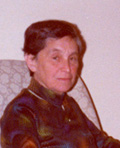Ruth Silberberg
| Interviewer: | Estelle Brodman |  |
| Date: | January 16, 1976 | |
| Identifier: | OH020 | |
| Approximate Length: | 53 min. | |
| Biographical Information: | Pathologist, 1906-1997. Silberberg was born in Germany and received her medical degree from the University of Breslau in 1931. She trained in pathology at the University until 1934, when she and her husband, Martin Silberberg, MD, fled to Canada to escape emerging Nazism. They conducted research in pathology at Dalhousie University in Nova Scotia until 1936, when they moved to St. Louis to join the Department of Pathology at the Washington University School of Medicine. After a four-year fellowship at New York University from 1941 to 1944, the Silberbergs returned to Washington University as instructors in Pathology. They often collaborated on research, particularly the study of aging and degenerative arthritis, until Martin Silberberg's death in 1966. In 1968 Ruth Silberberg was named professor of Pathology and professor emeritus in 1975. She then emigrated to Israel where she remained active in medical research until her death. | |
| Summary: | Silberberg discusses differences in medical education in Europe and the United States. She also discusses changes in the field of pathology in general and in the Department of Pathology at the Washington University School of Medicine over the course of her career. Changes due to the development of electron microscopy are recalled, as well as the difficulties Silberberg encountered working under dean of the medical school and head of the pathology department, Robert A. Moore. Silberberg talks of leaving Germany because of the rise of Nazism and her husband and her coming to St. Louis to work in with Leo Loeb. She also describes her research in growth and aging, the study of osteoarthritis, and the relation of diabetes and joint disease. | |
| Notes: | Sound level of audio recording is not consistent. |
| Read Transcript |
|---|
Listen to Interview |
|
Option 1 Download and open the audio file using your browser’s default media player. Audio interviews are presented in the MP3 audio format and may be accessed using QuickTime, Windows Media Player, or RealPlayer. Some audio files are very large and may take several minutes to load. Download Interview (49 MB) |
|
Option 2 Use the MP3 Flash Player below to listen to the interview. If you do not see the player, you do not have the Flash Player installed. Click here to install.
Click on the right arrow to start. (If you are using Internet Explorer you may have to click on the arrow twice to start the player.) |
Please note: The Becker Medical Library presents this oral history interview as part of the record of the past. This primary historical resource may reflect the attitudes, perspectives, and beliefs of different times and of the interviewee. The Becker Medical Library does not endorse the views expressed in this interview, which may contain materials offensive to some users.
